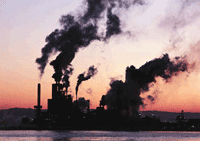
Dubai to develop strategies to reduce emissions
Dubai, February 26, 2012
Dubai will develop a strategy to reduce carbon dioxide and greenhouse gas emissions, as well as recommendations for ultimately monetising them through a groundbreaking carbon trading scheme.
The initiative is an integral part of the Dubai Integrated Energy Strategy 2030, including the plans to build a 1,000 MW solar power park in the Emirate which was announced last month.
The Dubai Supreme Council of Energy (DSCE) has partnered with Dubai Carbon Centre of Excellence (DCCE) to verify preliminary studies on carbon dioxide emissions.
An Emirate-wide research on greenhouse gas emissions will be carried out and frameworks developed with relevant industries aimed at introducing a comprehensive carbon dioxide abatement programme, said a statement.
At today’s signing of an MoU between the two entities, Saeed Al Tayer, vice chairman of DSCE, said the partnership was a further stage in the successful deployment of the Dubai Integrated Energy Strategy 2030 and an opportunity to encourage low-carbon industries and attract foreign investment.
“Our commitment towards a green economy starts today, with the creation of a platform to monitor and benchmark our carbon performance. Any policy or activity cannot be properly assessed unless it is measurable and quantifiable. The launch of the Mohammed Bin Rashid Al Maktoum Solar Park project in January and our partnership with the DCCE demonstrates the strength of the commitment to Dubai’s vision for a green economy as the basis for sustainable development,” he said.
Waleed Salman, chairman of the Dubai Carbon Centre of Excellence, said: “The DCCE was created to encourage and complement a business-led drive towards de-carbonising the UAE economy. The carbon abatement strategy will be a key step in translating these objectives into concrete action, generating additional momentum behind the Integrated Energy Strategy 2030.”
“DCCE expertise will help the council develop emissions reduction frameworks aligned with global standards, and harness the many economic opportunities of emissions reduction,” Salman added.
Further to a carbon dioxide baseline study by the DSCE in the fourth quarter of 2011, the DCCE will complete a detailed inventory of Dubai’s greenhouse gas emissions in line with the requirements of the International Panel on Climate Change, and the United Nations Framework Convention on Climate Change.
It will develop a monitoring, reporting and verification (MRV) framework, in order to harmonise and streamline data collection from the Council’s members, which include the main energy, manufacturing and utilities companies in Dubai, the statement said.
The DCCE will also recommend viable targets for reducing carbon dioxide and greenhouse gases and a methodology to monetise emissions, similar to the European Trading Scheme, the Clean Development Mechanism developed under the Kyoto Protocol, and other carbon reduction schemes.
The strategy would also examine the best options to build a ‘Clean Energy Fund’ linked to carbon dioxide reduction and dedicated to new investment in energy-related projects in Dubai, it said.
Nejib Zaafrani, secretary general and CEO of the Dubai Supreme Council of Energy, said: “Creating an incentive-based mechanism to reduce carbon emissions will establish a regional benchmark for sustainable development and help finance new investment in clean energy infrastructure, further supporting the growth of Dubai.
“The outcome of the Dubai carbon abatement strategy will provide the basis for a policy framework to reduce carbon dioxide emissions. It will serve as a template for motivating industry to achieve high standards in sustainability, and help to unlock new growth opportunities in the Dubai economy,” Zaafrani said.
“This initiative would be a contribution to UAE drive to achieve green economy for sustainable development and also contribute in turning UAE vision 2021 into reality in the coming nine years,” he added.
“We also aspire to play an active role at the federal level in the UAE’s efforts to develop and implement Carbon Capture and Storage (CCS) activities, through the DCCE,” Zaafrani concluded. – TradeArabia News Service







